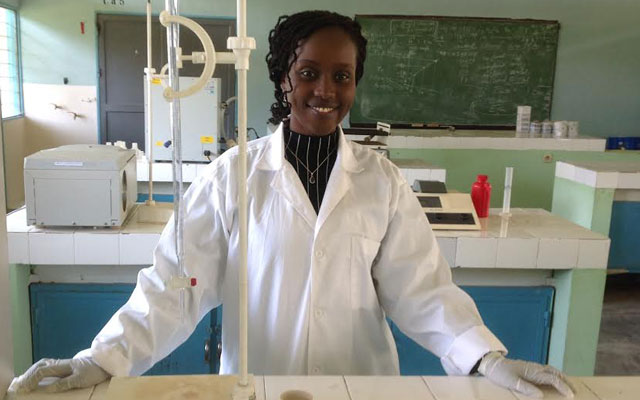 Industrial wastewaters, food leftovers and residues from animal manure and agriculture pose an urgent ecological and financial challenge. Urban and industrial waste, in fact, can contaminate water bodies and soil, and its disposal is causing health and environmental concern especially in developing countries. But there's some emerging good news, too: If properly processed and reused, such waste products could partially meet energy demand, reducing pressure on the environment and climate.
Industrial wastewaters, food leftovers and residues from animal manure and agriculture pose an urgent ecological and financial challenge. Urban and industrial waste, in fact, can contaminate water bodies and soil, and its disposal is causing health and environmental concern especially in developing countries. But there's some emerging good news, too: If properly processed and reused, such waste products could partially meet energy demand, reducing pressure on the environment and climate.
Rwanda has recently experienced an increase in household energy consumption, due to sustained urbanization rates.Therefore Rwandan scientists are trying to explore new, affordable clean strategies to meet local energy needs. Among the projects aimed at producing sustainable energy, one, in particular, is gaining momentum: the production of biogas from urban waste.
"Organic waste – mainly food remnants – represents the largest proportion of total household waste in Kigali City, accounting for about 74% in wet weight," explained Sylvie Mucyo at TWAS's General Meeting in Kigali. "Through anaerobic digestion (digestion in the absence of oxygen) of residual waste from food production, livestock and industrial effluent, we may obtain biogas for domestic and other purposes, along with a solid part called digestate that serves as nutrient for plant growth."
Biogas is mainly composed of methane (CH4) and carbon dioxide (CO2) and it is highly useful because it can be combusted to generate electricity and heat, but it can also be further processed into renewable natural gas and fuels.
Mucyo is deputy dean of the school of agricultural engineering and environmental management (SAEEM) at the University of Rwanda. She was among the Rwandan scientists who gave a presentation at TWAS's General Meeting, during the symposium “Innovation for Sustainability", dedicated to science and technology in Rwanda.
Mucyo in 2013 completed her PhD in applied environmental sciences at the University of Abertay in Dundee, Scotland. She also worked as a tutor in the lift-off learning skills project at Saint Paul’s Academy, in Dundee, a programme that aims at equipping young students with the technical learning skills they will need when they get to higher education.
Today she is involved in a research project that aims at recovering biodegradable municipal waste, manure and other organic waste to produce alternative fuel for various purposes. At TWAS's General Meeting, her presentation received great appreciation, because it showed how science could be a tool for the resolution of local problems in many developing countries.
In Rwanda, as well as in other developing countries, municipal solid waste management
represents an increasing concern especially around rapidly growing cities, the scientist explained. Open dumping, in fact, remains the main disposal route for waste in many communities, adding to health and environmental problems. Mucyo is currently working on anaerobic digestion of solid waste, to produce biogas which is presently used in Rwanda for cooking and lighting.
"Anaerobic digestion consists of the breakdown of biodegradable material/waste/residues by microorganism, in the absence of oxygen. The technique produces a biogas rich in methane gas, and a digestate rich in nutrients that can be used as biofertiliser," she said. Depending on the substrate, one ton of solids can yield 200-900 m3 methane gas. The digestate, on the other hand, can be used also as a conditioner, to enhance moisture retention and protect against soil erosion.
"Current practices in Rwanda, especially in prisons and schools, the digestion process of human wastes consists of a plugflow system of one or more tanks buried underground, and it usually takes almost 30 days to complete: digesting tanks are filled everyday, and biogas is continuously produced," highlighted Mucyo. "Even better results can be obtained through co-digestion, applying the procedure to a mixture of two or more types of wastes, however, this has not yet been applied in Rwanda."
Co-digestion produces many advantages: it offers a more balanced nutrient environment for the microorganisms thus increasing energy yield, and cleans out pathogen bacteria from waste, cleaning up the whole environment.
Rwanda has been investing many efforts in the use of waste resource for energy production, involving rural households, prisons and high schools, which has significantly reduced the demand for firewood. But the technology has been applied sporadically.
As Mucyo explained, to attain effective application of anaerobic co-digestion in Rwanda, better selection of feedstock quality must be carried out also through early laboratory trials on the starting materials. In addition, more strategic policies to drive the reuse of biogas and to stimulate private investment and collaboration in waste collection and treatment would be useful.
"So far, the technology has not been able to attract investment in the treatment of other biodegradable wastes, despite we can recover about 60-80% of the organic fraction for energy use and biofertiliser through the anaerobic process." For this reason, Mucyo and her colleagues have now begun outreach activities to share their research findings with stakeholders, so that they are able to put their research insights into practical use.
The public also needs to be involved in this process, through training activities that explain the connection between waste separation and public health, but also between waste separation and family income. "We should motivate people to select and reuse organic waste," she said, "showing how this activity could generate consistent financial benefits."
Cristina Serra

